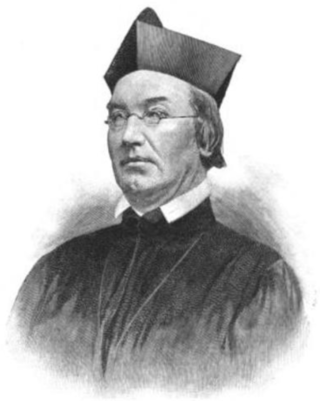
John Early was an Irish-American Catholic priest and Jesuit educator who was the president of the College of the Holy Cross and Georgetown University, as well as the founder and first president of Loyola College in Maryland. Born in Ireland, he emigrated to the United States at the age of nineteen. Upon his arrival, he enrolled at Mount St. Mary's Seminary in Maryland and entered the Society of Jesus, completing his education at Georgetown University in Washington, D.C.
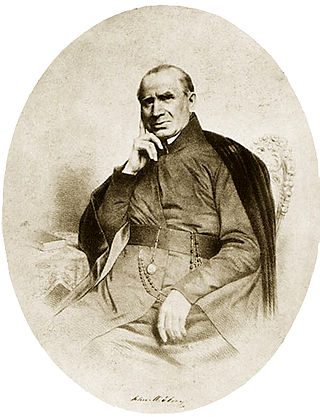
John McElroy was a Jesuit priest who founded Catholic schools in the United States. After emigrating to the United States in 1803, McElroy enrolled in Georgetown University in 1806, the same year in which he joined the Society of Jesus as a lay brother. His brother Anthony also became a Jesuit. McElroy assumed the management of Georgetown's financial affairs. He was ordained a priest in 1817. In 1822 he was sent to Frederick, Maryland, where he was to remain for 23 years as pastor of St. John the Evangelist Catholic Church in downtown Frederick. It was in Frederick that he founded St. John's Literary Institution. During the Mexican–American War, McElroy served as an Army chaplain, and on his return from Mexico he went to Boston, where he established Boston College and Boston College High School.

Thomas F. Mulledy was an American Catholic priest and Jesuit who became the president of Georgetown College, a founder of the College of the Holy Cross, and a Jesuit provincial superior. His brother, Samuel Mulledy, also became a Jesuit and president of Georgetown.

Charles William Lyons was an American Catholic priest who became the only Jesuit and likely the only educator in the United States to have served as the president of four colleges. Born in Boston, Massachusetts, he attended the local public schools before entering the wool industry. He abandoned his career in industry to enter the Society of Jesus. While a novice in Maryland, he suffered a nervous breakdown and was sent to Georgetown University as prefect. He then resumed his studies at Woodstock College, teaching intermittently at Gonzaga College in Washington, D.C. and Loyola College in Baltimore. After his ordination, he became a professor at St. Francis Xavier College in New York City and at Boston College.
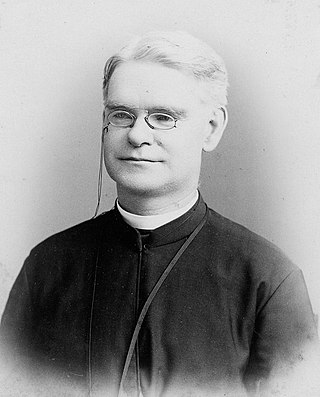
James Aloysius Doonan was an American Catholic priest and Jesuit, who was the president of Georgetown University from 1882 to 1888. During that time he oversaw the naming of Gaston Hall and the construction of a new building for the School of Medicine. Doonan also acquired two historic cannons that were placed in front of Healy Hall. His presidency was financially successful, with a reduction in the university's burdensome debt that had accrued during the construction of Healy Hall.

Anthony Francis Ciampi was an Italian Catholic priest and Jesuit missionary to the United States. He was responsible for rebuilding the College of the Holy Cross, of which he was president three times, after it was destroyed by fire and rescuing it from financial ruin and pressure to close by the Jesuits superiors.

Joseph Havens Richards was an American Catholic priest and Jesuit who became a prominent president of Georgetown University, where he instituted major reforms and significantly enhanced the quality and stature of the university. Richards was born to a prominent Ohio family; his father was an Episcopal priest who controversially converted to Catholicism and had the infant Richards secretly baptized as a Catholic.
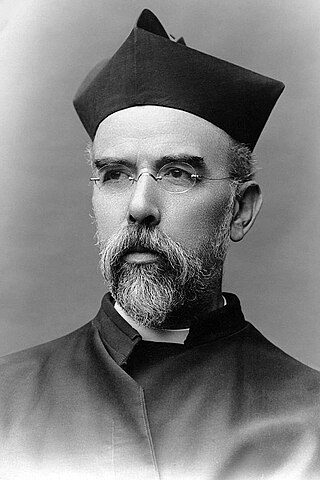
Joseph J. Himmel was an American Catholic priest and Jesuit. For much of his early life, he was a missionary throughout the northeast United States and retreat master. Later in life, he was president of Gonzaga College and Georgetown University in Washington, D.C.
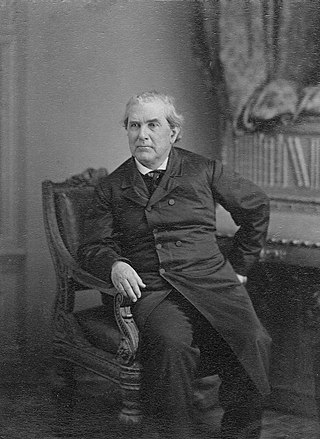
Charles Henry Stonestreet was an American Catholic priest and Jesuit who served in prominent religious and academic positions, including as provincial superior of the Jesuit Maryland Province and president of Georgetown University. He was born in Maryland and attended Georgetown University, where he co-founded the Philodemic Society. After entering the Society of Jesus and becoming a professor at Georgetown, he led St. John's Literary Institution and St. John the Evangelist Church in Frederick, Maryland. He was appointed president of Georgetown University in 1851, holding the office for two years, during which time he oversaw expansion of the university's library. The First Plenary Council of Baltimore was held at Georgetown during his tenure.

Samuel A. Mulledy was an American Catholic priest and Jesuit who served as president of Georgetown College in 1845. Born in Virginia, he was the brother of Thomas F. Mulledy, who was a prominent 19th-century Jesuit in the United States and a president of Georgetown. As a student at Georgetown, Samuel was one of the founding members of the Philodemic Society, and proved to be a distinguished student, which resulted in his being sent to Rome to complete his higher education and be ordained to the priesthood. Upon his return to the United States, he became the master of novices at the Jesuit novitiate in Maryland, before being named president of Georgetown. He sought to be relieved of the position after only a few months, and returned to teaching and ministry.

David Hillhouse Buel Jr. was an American priest who served as the president of Georgetown University. A Catholic priest and Jesuit for much of his life, he later left the Jesuit order to marry, and subsequently left the Catholic Church to become an Episcopal priest. Born at Watervliet, New York, he was the son of David Hillhouse Buel, a distinguished Union Army officer, and descended from numerous prominent New England families. While studying at Yale University, he formed an acquaintance with priest Michael J. McGivney, resulting in his conversion to Catholicism and joining the Society of Jesus after graduation.

John Dunning Whitney was an American Catholic priest and Jesuit who became the president of Georgetown University in 1898. Born in Massachusetts, he joined the United States Navy at the age of 16, where he was introduced to Catholicism by way of a book that accidentally came into his possession and prompted him to become a Catholic. He entered the Society of Jesus and spent the next twenty-five years studying and teaching mathematics at Jesuit institutions around the world, including in Canada, England, Ireland, and around the United States in New York, Maryland, Boston, and Louisiana. He became the vice president of Spring Hill College in Alabama before being appointed the president of Georgetown University.
James A. Ward was an American Catholic priest and Jesuit. He taught for many years at Georgetown and at the novitiate in Frederick, Maryland, of which he twice served as rector. He then became the vice president of Georgetown and was influential in the early years of Loyola College in Maryland. From 1857 to 1860, he was the President of Saint Joseph's College. He spent his later years as socius (assistant) to the Jesuit provincial superior in New York City, and teaching.
Francis Xavier Talbot was an American Catholic priest and Jesuit who was active in Catholic literary and publishing circles, and became the President of Loyola College in Maryland. Born in Philadelphia, he entered the Society of Jesus in 1906, and was educated at St. Andrew-on-Hudson and Woodstock College. He taught for several years in New York City and at Boston College, before entering publishing as the literary editor of America magazine in 1923, of which he became the editor-in-chief in 1936. While in this role, he was also active in founding and editing several academic journals, including Thought, and establishing various Catholic literary societies and book clubs. During World War II, he was chaplain to a Catholic organization that previewed movies for the National Legion of Decency. He also supported Franco's rule in Spain because of its support of Catholicism and opposition to communism; he also supported the US war effort. He was described as one of the early leaders of the revival of Catholic literature in the United States.
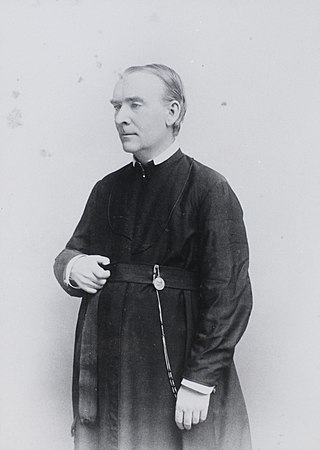
Edward Ignatius Devitt was a Canadian American priest, Jesuit, and historian of the American Catholic Church. Born in Saint John, New Brunswick, he moved with his family to Boston, Massachusetts, at a young age. He studied in public schools in the city before enrolling at the College of the Holy Cross. Devitt spent two years there, and then entered the Society of Jesus in 1859. He studied at the novitiate in Frederick, Maryland, and at the newly opened Woodstock College. He briefly taught at the Washington Seminary during his studies, and after graduating, was a professor for the next thirty years at Holy Cross, Woodstock, and Georgetown University.

Robert Wasson Brady was an American Catholic priest who led several Jesuit institutions in the United States. He served twice as the president of the College of the Holy Cross from 1867 to 1869 and from 1883 to 1887. He was also the second president of Boston College from 1869 to 1870 and the provincial superior of the Jesuits' Maryland Province from 1877 to 1882.

Robert James Fulton was an American Catholic priest and Jesuit who twice served as the president of Boston College, from 1870 to 1880 and 1888 to 1891. He was influential in the early years of Boston College, as he was in charge of all the school's academic affairs.
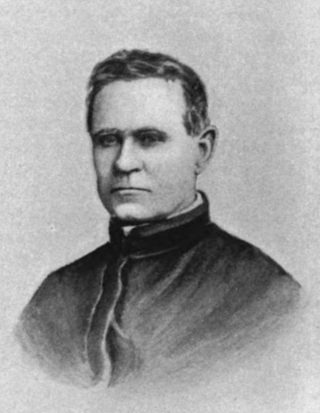
James Clark was an American Catholic priest and Jesuit who led the College of the Holy Cross during the American Civil War as president from 1861 to 1867. Born in Pennsylvania, he was educated at the United States Military Academy and served as an officer in the U.S. Army for one year, before converting to Catholicism and later entering the Society of Jesus.
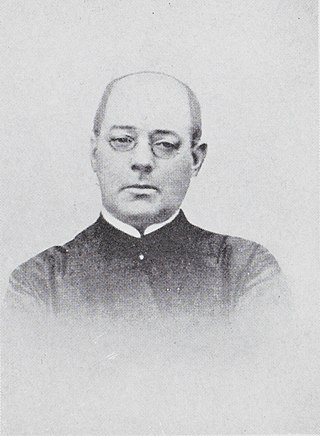
Edward Victor Boursaud was an American Catholic priest and Jesuit who was the president of Boston College from 1884 to 1887. Raised in New York City and France, he studied at Mount St. Mary's College in Maryland before entering the Society of Jesus in 1863. For the next 18 years, he studied and taught at Jesuit institutions, including Boston College, Georgetown College, and Woodstock College, as well as the novitiate in Frederick, Maryland. In 1881 and 1887, he served three-year terms in Italy as the assistant secretary to the Jesuit Superior General for the English-speaking world.
Edward D. Boone was an American Catholic priest and Jesuit who was the president of the College of the Holy Cross from 1878 to 1883. Born in Washington, D.C., he graduated from Holy Cross in 1851 and entered the Society of Jesus the following year. Before becoming president, he taught at various Jesuit colleges. He spent the last twenty-five years of his life at Loyola College in Maryland and as a prison chaplain.

















